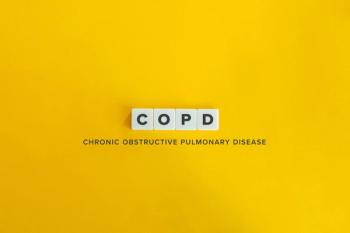
Assessing Inhalation Technique in Uncontrolled Asthma, COPD Patients Using a Digihaler System
Electronic inhaler devices record objective inhalation quality data and permit assessment of patient efforts.
Inhalers are one of the most important forms of treatment for chronic obstructive pulmonary disease (COPD) and asthma. Using the devices correctly is vital for proper delivery and disease control. However, with more types of devices entering the market, up to 90% of patients make errors when using an inhaler due to confusion.1
Digital inhalers use a built-in sensor to detect inhaler use, measure inspiratory flow, and capture potential technique errors. The data is then transferred to a mobile app where a physician can view it. This system can play an important role in addressing poor inhaler technique challenges among COPD and asthma patients by providing objective data.
Two recent studies sought to evaluate inhaler technique in patients with uncontrolled asthma and COPD using a Digihaler system. The research was presented at the 2023 American Thoracic Society International Conference, held from May 19 to 24 in Washington, DC.
In one study, investigators conducted a post-hoc analysis among patients with asthma using the Maintenance and Reliever Digihaler System. Data was gathered from the CONNECT2 study, which evaluated the FDA-approved Digihaler digital maintenance (fluticasone propionate/salmeterol (FS]) and reliever (albuterol sulfate) inhalers.2
Investigators found that, besides week 1 when patients were gaining familiarity with the device, the proportion of inhalations performed by patients using the Digihaler that were categorized as ”good” or ”fair” was consistently high. There was also no evidence of technique decay in all subsequent weeks during the study period.
Additionally, rates of “good” inhalation were maintained from week 2 through week 24 with both the maintenance and reliever Digihalers.
“Use of electronic inhaler devices with built-in flow sensors providing feedback on inhalation quality may help patients maintain proper inhaler technique and asthma disease self-management by having objective data on how well they use their inhalers,” the authors concluded.
In the second ongoing study, investigators are conducting an observational, multicenter 3-month study to gain insight into the variability of inhalation technique quality over time among COPD patients using the Prodir Digihaler (albuterol, 90 ug).3
The study cohort included 21 patients with spirometry-confirmed COPD and increased exacerbation risk. Patients switched from a rescue inhaler to an albuterol Digihaler. Inhalation volume and peak inhalation flow were recorded with each use of the Digihaler.
Investigators found that out of 4923 inhalations over the study period, more than 92% of participants maintained good inhalation quality after the first week. The patients were also typically able to generate inhalation flow and volume sufficient for drug delivery, according to analysis of distributions of inhalation volume and peak inhalation flow.
“The Digihaler System is able to record objective inhalation quality data, permitting assessment of patient efforts and technique,” the authors wrote. “Data from the Digihaler System communicated to providers via the physician-facing dashboard may aid in assessing whether poor technique or other factors underlie clinical deterioration.”
Reference
1. Usmani OS, Lavorini F, Marshall J. et al. Critical inhaler errors in asthma and COPD: a systematic review of impact on health outcomes. Respiratory Research. 2018;19(1):10. doi:10.1186/s12931-017-0710-y
2. Wechsler M E, Hoyte F, Safioti G, et al. Inhaler technique maintenance in patients with uncontrolled asthma using a maintenance and reliever Digihaler system. Presented at: American Thoracic Society International Conference; May 19-24, 2023; Washington, DC. Poster 1294.
3. Wang T, Ohar J A, Hill T, et al. Inhalation technique maintenance in COPD patients using the albuterol Digihaler. Presented at: American Thoracic Society International Conference; May 19-24, 2023; Washington, DC. Poster 2849.
Newsletter
Pharmacy practice is always changing. Stay ahead of the curve with the Drug Topics newsletter and get the latest drug information, industry trends, and patient care tips.























